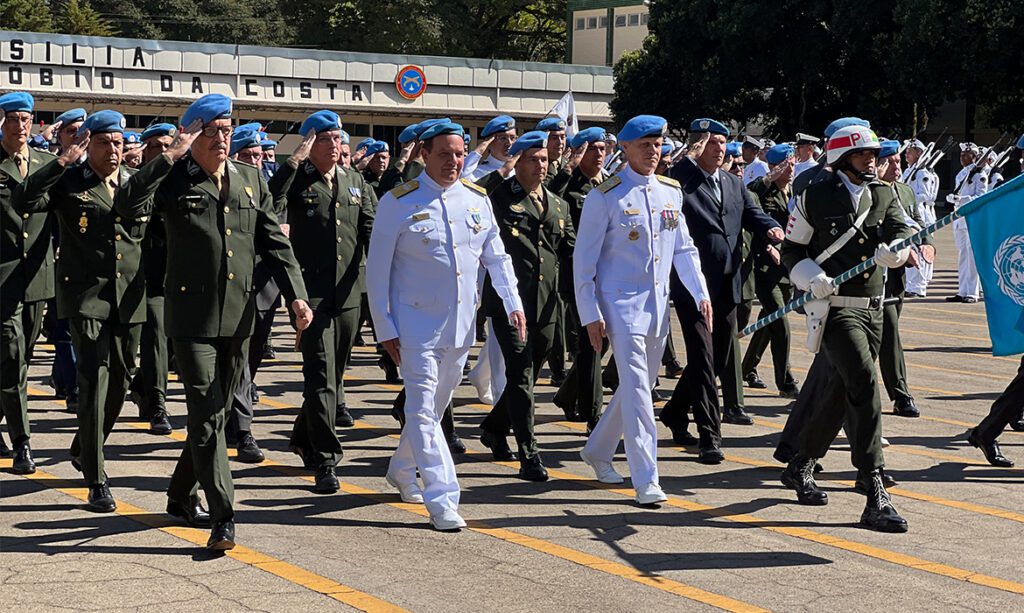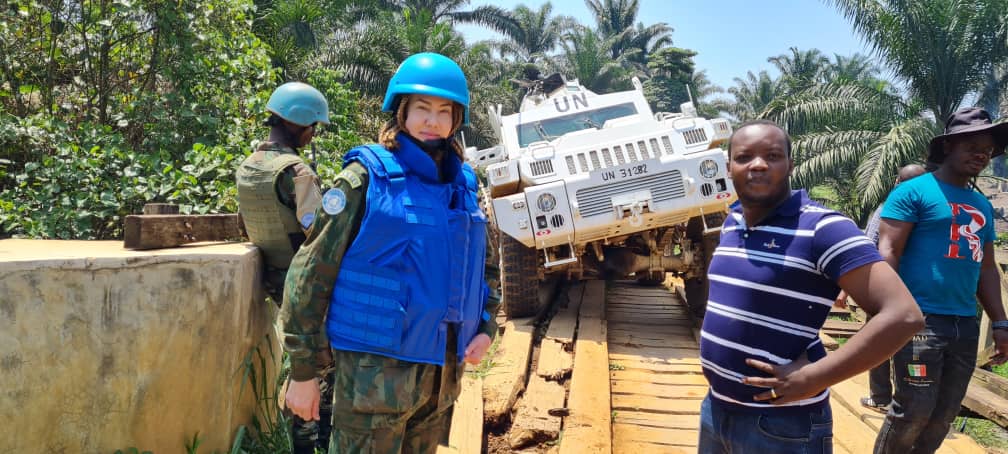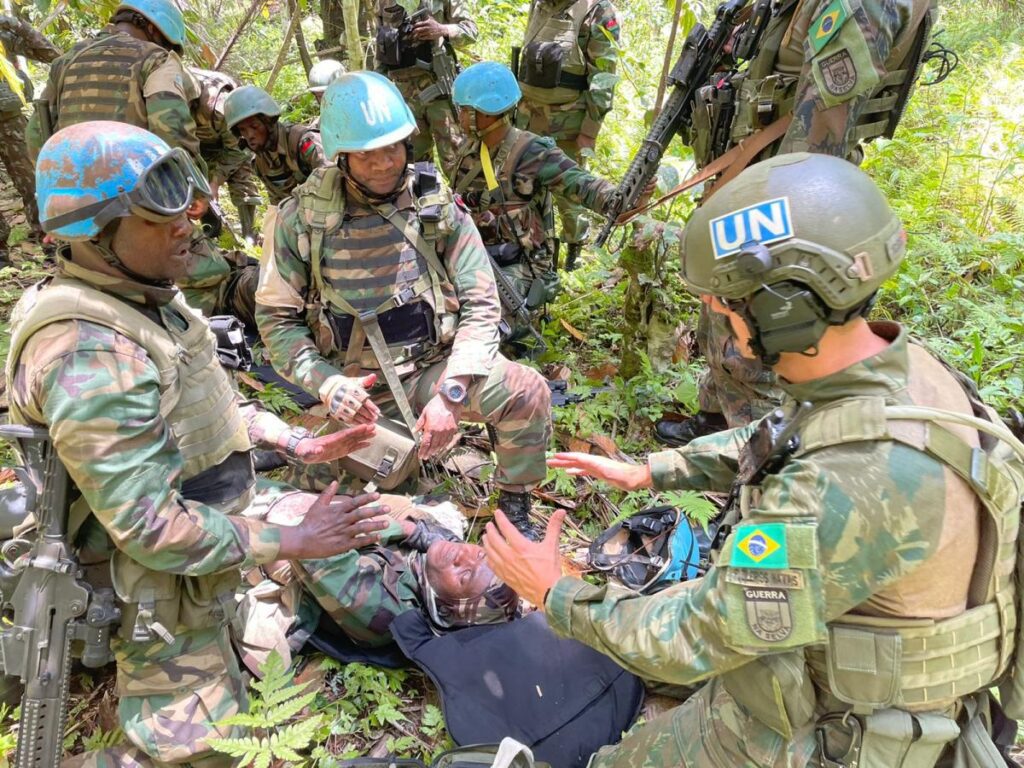Brazilian Armed Forces have already participated in 60 missions promoted by the UN
First-Lieutenant (RM2-T) Luciana Santos de Almeida
United Nations (UN), representing Brazil, were honored today (30) in a military ceremony conducted by the Ministry of Defense, at the Army Police Battalion in Brasilia. For those who do not know the work of these men and women known as “blue berets or blue helmets”, they are civilians and military personnel – from the three Forces – who bring security and tranquility to populations of countries marked by conflicts and tragedies.
The blue beret or helmet symbolizes the hope and the commitment of Brazil and of all countries to peace among peoples. The Minister of Defense, Paulo Sérgio Nogueira de Oliveira, highlighted in his Order of the Day alluding to the date, the current readiness of Brazil in the employment in peace missions. “This capacity is materialized by the availability of UN-certified human and material resources of the Armed Forces, as well as by the excellence of Brazil’s Joint Peace Operations Center and Naval Peace Operations Center. Brazil is able to send military contingents to peace missions, contributing to the projection of the country in the international arena”.
In reference to the International Day of Peacekeepers, the Navy’s Commander of Naval Operations, Fleet Admiral Marcos Sampaio Olsen, highlighted, in his Order of the Day, the Navy’s commitment to continue preparing its military personnel to act in conflict mitigation wherever necessary.
“There is no doubt that today’s threats will continue to loom, and peacekeepers will have the arduous task of leaving the comfort of their homes to deploy to different theaters of operation. The commitment to physical, intellectual, and tactical preparation will allow the Naval Operations Command to remain in a condition of ready employment wherever Brazil’s foreign policy so determines,” he reinforces.
“On this United Nations International Day of Peacekeepers, I congratulate the members of the MB who, in the past and present, have marked a high degree of readiness. At the same time, I urge them to continue with honor, professionalism and belief, ensuring the country the means of power necessary to mitigate conflict and human suffering,” he concluded.
For the Commander of the 7th Naval District, Vice-Admiral Gilberto Santos Kerr, one of the Peacekeepers present at the event, having participated in a UN Peacekeeping mission was very important, especially from the professional point of view.
“It was an opportunity to prepare the ground for the UNIFIL Maritime Task Force to arrive in Lebanon and be able to conduct its work well. Moreover, it was a pride to have been honored today in a ceremony like this, because it shows that peacekeepers and the military of the Brazilian Navy are respected around the world,” he said after parading.
Third Sergeant (FN-IF) João Antônio Ribeiro Monteiro, who in 2008 was in a Peace Mission in Haiti as a soldier, and also paraded in the event, said that no military comes back the same way after a peace mission. “On days like today, we get to remember and value even more the things we have in our lives, because we gained experience, we grew as military personnel, and we were able to help our country be respected in the world,” he said.
International Day of Peacekeepers

The International Day of Peacekeepers, established by the UN official calendar, is celebrated every year on May 29th. The Brazilian Armed Forces have been present, in the last 74 years, in 60 peacekeeping missions, sending more than 59 thousand soldiers.
Brazil has been an active member in observing ceasefire and peace agreements since 1933, when, represented by the Brazilian Navy, it accompanied the negotiation between Colombia and Peru in the War for the Leticia region. After the defeat of Nazism, troops were sent to the Greek border to act in the United Nations Special Committee for the Balkans.
Brazilian military personnel collaborated as “blue berets” in the Suez Canal crisis, South Africa, Angola, Cambodia, Cyprus, Ivory Coast, Croatia, El Salvador, Ethiopia/Eritrea, Guatemala, Guinea-Bissau, Haiti, Yemen, India-Pakistan, Iran, Yugoslavia, Lebanon, Liberia, Macedonia, Mozambique, Nepal, Nicaragua, Central African Republic, Democratic Republic of Congo, Dominican Republic, Western Sahara, Serbia, Sudan, Timor-Leste, and Uganda-Rwanda.
Report of a military of the Brazilian Navy in the “MONUSCO” Peace Mission (Africa)

For Sabrina dos Passos Barbosa, corvette captain (T), who is participating in the “MONUSCO” Peace Mission in the Democratic Republic of Congo, “being selected by Brazil to contribute to that country is a dream come true. I always wanted to have more contact with the operational side of military activities.
Her role in the mission is related to the activities of the battalions and operations in the field, mainly because of the need to develop the work of “building trust” with the local population. “It is rewarding to realize that the fact that I am Brazilian and a woman facilitates the work that I need to do.
Brazil’s image is very positive and in my activities, mutual trust is essential”, she highlighted. The position that the Corvette Captain (T) Sabrina occupies in the Mission is “FIB G9 Deputy Chief”, where G9, in the organizational structure of UN Peace Missions, means Civil Military Coordination (CIMIC). Her job consists of developing activities together with the military, police and civilian components regarding policy, security, humanitarian development, infrastructure and various other dimensions of the mission.
“It is also part of my activity to foster outreach and monitor collaborative relationships with local security forces, authorities and population. Within this context, one of the most important aspects of my work is the proposal and monitoring of quick impact projects to improve the living conditions of the local population, consisting in the construction or renovation of bridges, schools, hospitals, among other things, and projects to reduce community violence, such as installing electric lighting in public roads and villages,” she said.
For almost four months in the mission, the most remarkable experience, according to her, was to participate in a field operation, whose objectives were to prevent an armed group from attacking internally displaced people’s camps and regain control of the region, returning it to the local security forces.
“I followed the development of the field operation and all the troop movements on the ground and made contact with local leaders to ask for support for the operation. In addition, I visited a hospital that was attacked and supported the project to reestablish this health unit,” he said.
Cultural diversity and family support

Cultural diversity is one of the most positive points of a mission like this. Corvette Captain (T) Sabrina arrived in the location on February 16 this year and is scheduled to leave the mission in February 2023, so she will spend about a year away from Brazil and, consequently, from her family.
“Living with so many different behaviors and perceptions makes me question many things and learn a lot. In such a diverse environment I am convinced that the key to solving almost all problems is mutual respect. Leaving my country, where I knew all the rules of living together, and finding myself in a multicultural environment will have no other result than to make me a better person and more aware of the importance of human relations,” she reflected.
The officer says that big changes are not possible in the short term, and that, therefore, in an environment like this one, where deprivation is extreme and resources are limited, perseverance and willpower to make things work often count the most.
“I want to leave with the perception that the situation is better than when I arrived, especially considering my activities. I really hope to have this perception when the day comes that I leave this country,” he concluded.
*** Translated by DEFCONPress Team ***
